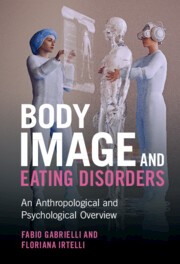Book contents
- Body Image and Eating Disorders
- Body Image and Eating Disorders
- Copyright page
- Contents
- Acknowledgments
- Part I Contemporary Perspectives in Anthropology, Philosophy, and Psychology on the Human Body: An Introductory Overview
- 1 The Conception of the Human Body: An Evolutionary Study from Ancient Times to the Hypermodern Era
- Part II Brain without Body, Body without Brain, and Contemporary Body Image Disorders
- Part III The Hypermodern Contradictory Relationship with Food
- Part IV Which Possible Horizons? Some Final Considerations
- References
- Index
1 - The Conception of the Human Body: An Evolutionary Study from Ancient Times to the Hypermodern Era
from Part I - Contemporary Perspectives in Anthropology, Philosophy, and Psychology on the Human Body: An Introductory Overview
Published online by Cambridge University Press: 26 May 2022
- Body Image and Eating Disorders
- Body Image and Eating Disorders
- Copyright page
- Contents
- Acknowledgments
- Part I Contemporary Perspectives in Anthropology, Philosophy, and Psychology on the Human Body: An Introductory Overview
- 1 The Conception of the Human Body: An Evolutionary Study from Ancient Times to the Hypermodern Era
- Part II Brain without Body, Body without Brain, and Contemporary Body Image Disorders
- Part III The Hypermodern Contradictory Relationship with Food
- Part IV Which Possible Horizons? Some Final Considerations
- References
- Index
Summary
In this chapter the body concept evolution is introduced, and its anthropological and psychological implications analyzed in depth. The concept is explored using a theoretical excursus beginning with Plato, the Hippocratic school, and Aristotle, and on to the assumptions of Nietzsche and then the biopower theory of Foucault and Deleuze’s pragmatics of the body, before arriving at current theorizing about the body. Some interesting perspectives on the body are presented which reveal that the human body still occupies a central role in contemporary society. For example, in today’s society the female body tends to become an object of lust, sexual gratification, and seduction, and is used widely on social media by companies, and in advertising campaigns to sell products. Furthermore, today human bodies are often compared to machines, with concerning consequences.
- Type
- Chapter
- Information
- Body Image and Eating DisordersAn Anthropological and Psychological Overview, pp. 3 - 24Publisher: Cambridge University PressPrint publication year: 2022

